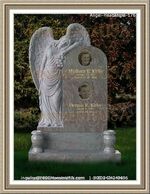|
Basics You Should Expect When Considering An Epitaph
Setting up funeral arrangements is a job that entails a long list of details. These are usually left to a responsible member of the deceased's family or various tasks may be assigned to several individuals for less stress on one mourner. A key part of this duty is composing an epitaph worthy of the person it will represent.
This is a brief statement or phrase, sometimes a poem or prose, that is inscribed on an individual's headstone or commemorative plaque. It says something about the person it represents. There are several different forms this tribute can take, mostly dependent on the deceased's personality, life choices and who is writing it.
Practically every commemorative plaque or stone will bear information identifying the person. In the very least, this includes their name and typically a date for their birth and their death. While some opt to leave it at that, others choose to also add something extra like a sentiment, statement or further details about their life.
For many, traditional sentiments such as wishes for a peaceful slumber or an explanation of how loved the deceased was is all they add. The statement may be an attestation about their family relations, community work, military service or other accomplishments. It is also quite the popular choice to use a meaningful piece of scripture for this purpose.
A lot of people are choosing to design their own headstone. The primary benefit to this is that they can be sure that their last impression will be one they are comfortable leaving. It allows a bit of freedom, for example, for a person who was known for their sense of humor to be entertaining and witty with their final remarks.
Those who write their own might also like to use this as a platform to impart a last bit of wise advice to others. Often this involves encouraging people to be happy and live life well. One can be as creative as they wish with their final statement.
|
|



























